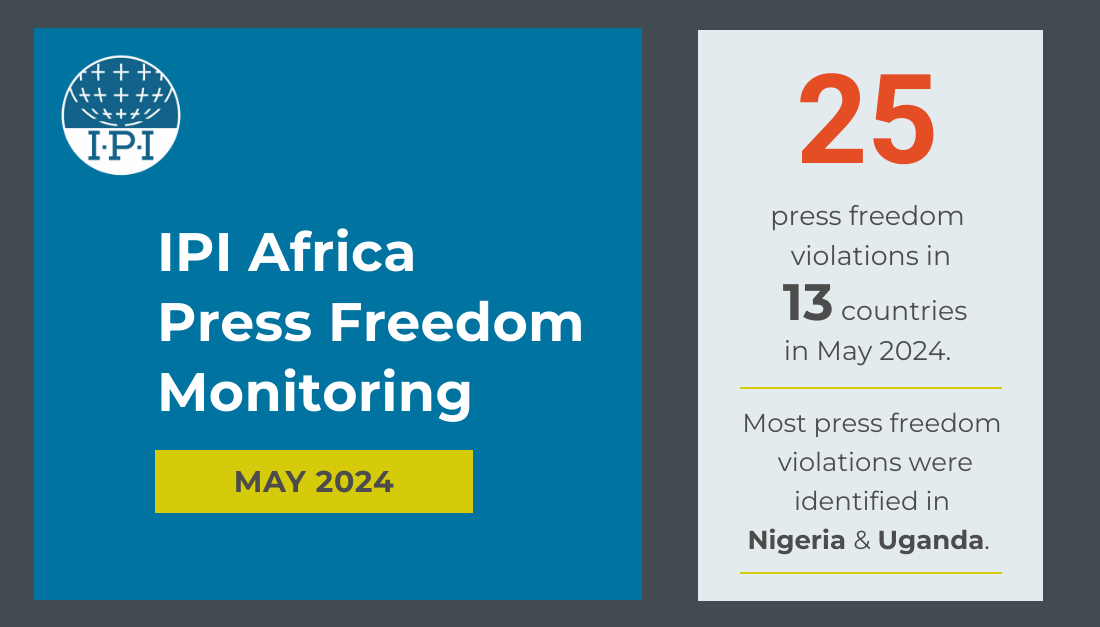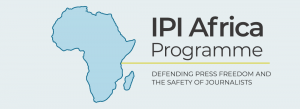In May 2024, IPI documented at least 25 violations or threats to press freedom in 13 countries in sub-Saharan Africa. These violations affected 20 male journalists and 7 female journalists. Cases of arrests and detention were the most common violations documented, followed by physical, verbal, or online attacks and censorship. The highest number of violations were documented in Nigeria. State actors remain the main perpetrators, responsible for 88 percent of the violations recorded.
In Nigeria, authorities continue to rely on the cybercrime law to harass journalists. Journalists Nurudeen Yahaya Akewushola and Dayo Aiyetan of the International Centre for Investigative Reporting (ICIR) were recently detained by the police for over nine hours and interrogated in connection to an investigative report that uncovered allegations of corruption involving former Inspector Generals of Police. The local press defense group, Media Rights Agenda (MRA), condemned the incident as a continuing blatant police violation of press freedom and called on President Bola Ahmed Tinubu to take urgent measures to safeguard media freedom.
Similarly, in Somalia, the detention of journalists by the police continues. On May 12, SSC-Khaatumo police in Lasanod detained Abdirisaq Abdirahman Mohamud Duale, a reporter for Kobciye Media, a Facebook-based news platform, in Lasanod town. Abdirisaq was arrested after he published an interview with a member of SSC-Khaatumo forces who threatened to “harm prisoners held in Lasanod prison in retaliation for prisoners held by Somaliland”. The journalist was freed on May 19, 2024, after being held at the police station for eight days without charges being filed.
Meanwhile, in Uganda, on May 18, bodyguards of politician Bobi Wine of the National Unity Platform (NUP), physically attacked, and damaged the cameras of three women journalists covering the burial of the late Pascal Ssekasamba, a UK-based businessman. The journalists who were attacked were Gertrude Mutyaba of NTV, Magret Kayondo of Radio Simba, and Zainab Namusaazi of NBS TV. Other journalists’ equipment was destroyed by a group of private bodyguards. One of the overzealous bodyguards, Achileo Kivumbi, targeted journalist Namusaazi of Next Media and damaged her camera. The police reported that they had opened an investigation into the assault.
Ahead of the May 29 elections in South Africa, sympathizers of the political party uMkhonto weSizwe (MK) assaulted several journalists. On May 21, at least two women journalists covering the party’s rally at Orlando Stadium in Soweto were harassed, intimidated, and aggressively abused. SANEF, the local press defense group added that journalists and photographers reporting on the political rally were pushed to the floor, and some women journalists were kicked and verbally abused by people in military attire. However, during the general election day, no incidents of threats to press freedom were noted.
In Guinea, the military-led regime revoked the broadcasting licenses of at least six radio stations, citing alleged non-compliance with the licensing terms. The affected media outlets include FIM, Espace, Sweet, and Djoma, as well as Djoma TV and Espace TV stations, which were specifically targeted by the authorities.
DOWNLOAD THE FACTSHEET HERE (PDF FILE)

